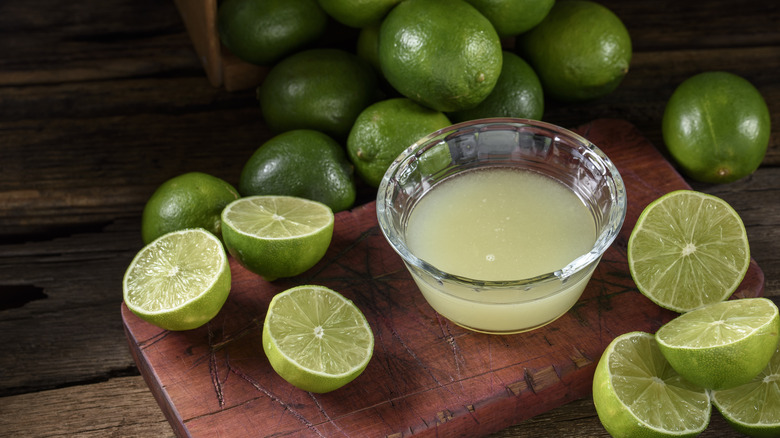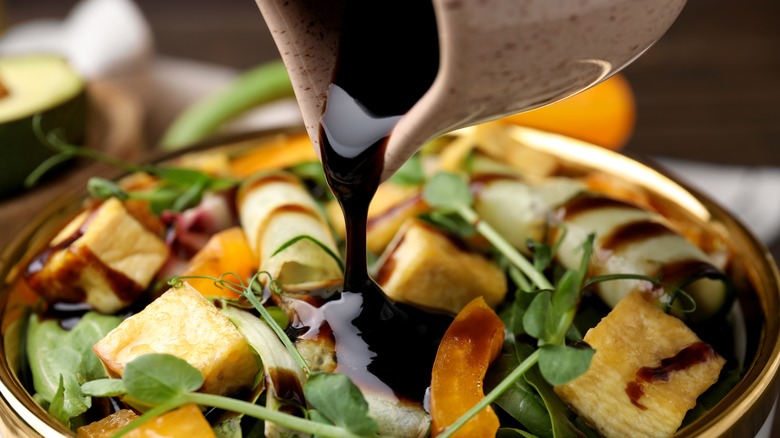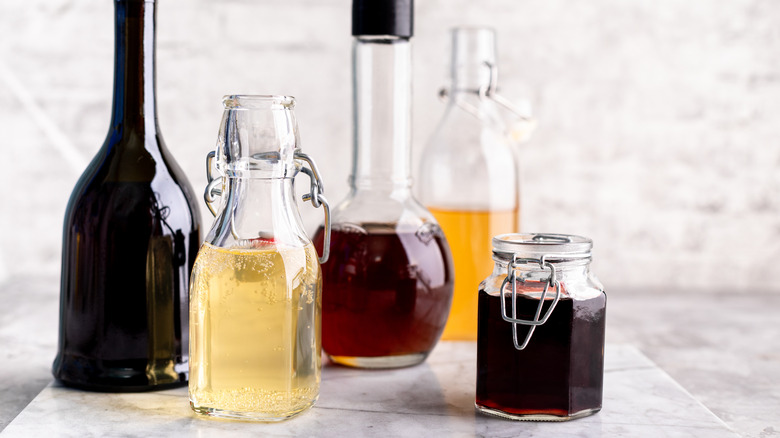What You Need To Know Before Substituting Vinegar For Lime Juice
If you've ever set out to make a recipe that calls for a bit of lime juice only to discover you don't actually have any in your fridge, vinegar can make an easy substitute. Like lime juice, vinegar is acidic, so in recipes that need the lime for acidity, this can work well.
The one thing to be aware of if you're going to use vinegar as a lime juice replacement is that you can't simply pour it in a 1:1 ratio. Vinegar is a stronger substance than lime juice, so if you're not careful, it can wind up leaving your dish with an overpowering flavor. As such, it's best to add less vinegar than lime juice to ensure you don't wind up throwing your recipe off. In general, a 1:2 ratio of vinegar to lime juice works when swapping this ingredient in. It's best to start with less and slowly add more as needed to ensure you don't overdo it on the acid.
What's more, some types of vinegar have tasting notes that can throw off your recipe, so the style you use in your dishes is important. Milder vinegars can get you the acidity you need without introducing unwanted flavors into your meal.
Think about the type of recipe you're using it in
When replacing lime juice with vinegar, it's important to consider the type of recipe you're using it in and how that will affect the amount you add. For one thing, you can use it in dishes where the vinegar will partially cook off. This helps ensure that the flavor isn't too overpowering. You can swap in vinegar for lime juice in dishes that include marinades, which will help infuse meats and veggies with flavor but get cooked off when you prepare your meal. You can also use vinegar in place of lime juice in sauces, for example, in a pasta sauce recipe. In these dishes, the vinegar partially cooks off when you heat the sauce, helping prevent the flavor from becoming too strong.
Recipes where the vinegar will be cooked off aren't the only dishes you can try this swap in. You can also use it in things like ceviche or salad dressing to add acidity. Just be careful if you do so, as the vinegar taste will be much stronger. Go slowly when adding the vinegar; you can always adjust your recipe and stir in more, but once the vinegar is added, you can't take it out.
Don't forget about the style
Another factor to think about is the type of vinegar you choose. Some vinegars make for a great substitute, while others don't quite provide a welcome flavor profile. Stick with mild vinegars as these tend to work better as alternatives to lime juice. White wine vinegar is a great option here. This variety has a lighter, fruity flavor and works well in salad dressings. At the same time, it's softer and not as strong as a classic distilled white vinegar, which can make it a better choice when you're substituting for lime juice.
You could also try using red wine vinegar, which has a stronger flavor than white wine vinegar. It has a deep, tangy taste to it which can work particularly well if you need an acid for pairing with red meat or using in hearty sauces.
Another choice is apple cider vinegar. There are tons of reasons to use apple cider vinegar, starting with its sweet and fruit-forward flavor that adds complexity to your dishes. It's also well-loved for its health benefits, such as its high levels of acetic acid. This one might work well for a ceviche to add some lighter notes to the seafood. Next time you're out of lime juice for your cooking, try one of these vinegar swaps and get ready for ae easy alternative that adds its own unique touch of flavor to your dishes.


